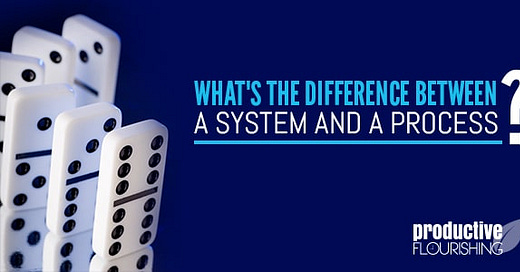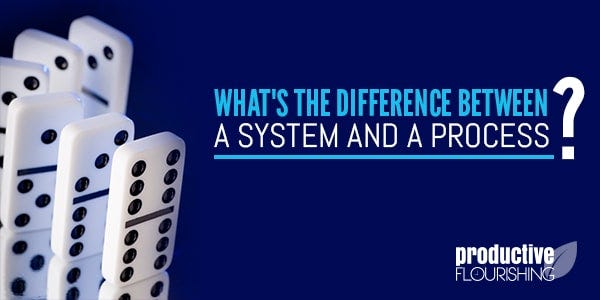What's the Difference Between a System and a Process?
And how well aligned are your processes and systems to get you results?
I was recently at breakfast with other guests at a B&B, and we all started talking about what we do. With some of the newer things we're doing here at ProFlo, my cocktail line isn't nearly as awkward as it used to be. I mentioned that our company helps small businesses get through the awkward, constricted stage of business where they get stuck and can't grow.
Tom — the gentleman to my right — perked up when I said that. As it turns out, he was in a business with exactly that problem. He asked a few great questions, and before long I commented on what it takes to get through Stage 3 — getting the right people, processes, systems, and positioning in place. But, he asked one question I wanted to answer here.
"What's the difference between a system and a process?"
A process is a conceptual sequence of events that enables a people in a business to do what they do. Most of the time, you're not aware they're there until someone like me comes and starts making them obvious. For example, the way a support request gets handled is a process. There's an input, some work sequences, and an output.
Let's make this more concrete. In our company, Shannon handles our customer care requests. A customer may write and ask whether we can send them the download link to a product they bought after they lost or misfiled their purchase. Shannon locates their order record, confirms they've bought it, sends them the link, and then ensures they got what they needed. All of that is a process. (And, yes, processes can have sub-processes.)
Systems are what's used to execute the process. Let's follow the use the same example to discuss the systems we use here at ProFlo. We receive the request via email (GoogleApps), and then Shannon locates the record and sends the link using Infusionsoft. The products themselves are stored on AmazonS3 given some of the peculiarities of Infusionsoft.
As a general rule, “processes address effectiveness, whereas systems address efficiency."
If you're doing the right slower than they could otherwise be done, work on your systems. If you're working fast but not really getting anywhere, work on your processes. Default to processes if you're not sure either way.
Fairly straightforward, right? Well, not so much.
One of the things I have a keen eye for is when processes and systems aren't supporting the people or other processes and systems within a given business.
For instance, let's imagine that part of our process is that I get the customer care requests and feel that I must personally respond to the customer; let's have it be representative to how many businesses I've worked with and assume that Shannon is still in the process somewhere. Putting myself in the process adds at least three steps and delays the customer getting served, for what gain?
As you could tell, it would be easier to streamline the process and eliminate unnecessary agents and steps, but it's often the case that owner-executives won't do that because they believe they need to be involved in "essential" business processes. Never mind that they could always follow-up to customer care requests after they've been solved rather than being a bottleneck to the solution.
You could also see that systems changes can have a positive effect on business performance, too. Dropbox, for example, removes some of the awkwardness of either traditional file sharing or sending a bunch of files via email. The Dropbox system makes the process of sharing and collaborating on files easier.
In an ideal world, systems support processes which support people."
Needless to say, most of our businesses aren't ideal in this way. People get crushed under processes, systems require a lot of maintenance, and meta-work can be more resource-exhaustive than the work that needs done.
As I talk about these four key factors, I always place the priority on the right people. This is important because it's often harder to find, train, and retain the right people than it is to develop the processes and systems those people need to collaborate together. The right people can often create better processes and systems, as well - or simply eliminate bloated ones that are adding work to a business without adding a commensurate level of value. The dreaded reports for reporting's sake tends to be more of a people problem than a process or system problem. (How to find the right people is a whole different post entirely.)
How well aligned are your processes and systems? Which process or system, if improved, would make the biggest difference to your results?





